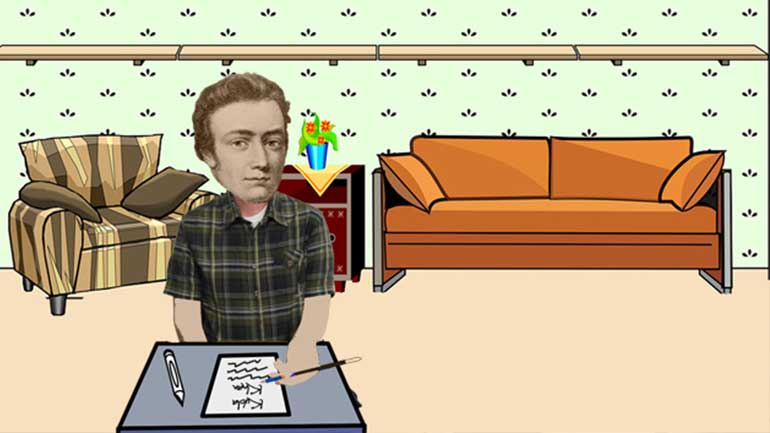ShmoopTube
Where Monty Python meets your 10th grade teacher.
Search Thousands of Shmoop Videos
Literary Forms Videos 43 videos
We may all be fools when it comes to love, but thankfully none of us will accidentally switch places with our twin brother and fall in love with ou...
They say that honesty is the best policy, but Jack lies about his identity and still gets the girl. Does that mean we should all lie to get what we...
Books are meant to be enjoyed. Sure, authors have different motives for their works—some may want to start a revolution while others hope to deli...
Sonnets 9278 Views
Share It!
Description:
This video defines sonnets, a favorite of William Shakespeare. What are the different types of sonnet? How do you identify different kinds of sonnet (spoiler alert: rhyme scheme plays a big role)?
Transcript
- 00:00
Sonnets, a la Shmoop. Hope you like your poems with a little structure.
- 00:18
Free verse poetry is a popular form nowadays, as it allows a poet to write without strict
- 00:23
guidelines of rhyme or meter. [scroll writes on chalk board and then on wall]
- 00:26
On the opposite end of the spectrum is the “sonnet”…
- 00:29
…which doesn’t really believe in… writing outside of the box. [sonnet bashes scroll over the head with a ruler]
Full Transcript
- 00:32
That’s not to say that there isn’t room for creativity in a sonnet…
- 00:35
…but you’d better be creative using imagery, rather than fiddling with the format.
- 00:40
Okay, so who are these authoritarian poems who don’t believe in rule-breaking?
- 00:45
Sonnets are 14-line poems… yes, 14 lines exactly…
- 00:48
…and they follow a very rigid rhyme scheme.
- 00:53
There are actually a few different types of sonnets…
- 00:55
…but the most famous is the Shakespearean, or English, sonnet. [Shakespeare walks down red carpet with paparazzi]
- 01:00
Bill Shakespeare wrote over 150 of these bad boys, which is why they’re named after him.
- 01:04
He also had over 150 unpaid itemized statements, which is why those are today called “Bills.”
- 01:12
In a Shakespearean sonnet, the rhyming pattern is a-b-a-b-c-d-c-d-e-f-e-f-g-g.
- 01:20
Or, to express that in terms that aren’t a hodge-podge of letters…
- 01:24
…the lines that rhyme with one another in a typical English sonnet are:
- 01:28
…the first and third, the second and fourth…
- 01:31
…the fifth and seventh, the sixth and eighth…
- 01:33
…the ninth and eleventh, the tenth and twelfth…
- 01:35
…and finally, the last two.
- 01:38
Any deviation from that structure, and you no longer have a sonnet.
- 01:42
That’s a lot of pressure on a poor little poem. [sonnet hold up a rock over it's head]
- 01:44
And yet… there’s more.
- 01:46
Most… but not all… English sonnets use iambic pentameter…
- 01:50
…which relates to the words or syllables that are stressed in each line of the poem.
- 01:55
Although… with so many rules in place, it’s a wonder the entire poem isn’t stressed [sonnet lounges on pool deck chair]
- 02:01
If we take a look at the first couple lines of our sample sonnet…
- 02:03
…you can see that every other syllable gets a bit of emphasis.
- 02:06
It’s almost like the rhythmic beating of a drummer.
- 02:08
But with fewer groupies. So yeah, a sonneteer is bound by quite a few
- 02:12
stringent rules.
- 02:12
But that structure doesn’t prevent sonnets from hitting us on a gut level. [small man kicks sonnet in the stomach]
- 02:16
In fact, it almost turns them into little songs…
- 02:18
…which is what the word actually means…
- 02:21
…and that smooth, cadenced pattern draws us in rather than closes us off. [sonnet sprouts wings and flies off]
- 02:27
Read all 150-plus of Shakespeare’s sonnets and see if you agree.
- 02:31
Good luck not speaking in iambic pentameter for the rest of the week.
Related Videos
Books are meant to be enjoyed. Sure, authors have different motives for their works—some may want to start a revolution while others hope to deli...
Want even more deets on wordiness? Click here to review. Or take a look at our entire grammar section for all the goods.
Want even more deets on tenses? Click here to review. Or take a look at our entire grammar section for all the goods.
Want even more deets on semicolons? Click here to review. Or take a look at our entire grammar section for all the goods.
Asking questions can help spice up an essay. Just make sure you don't get too spicy and forget to answer those questions. You don't want to leave y...














































